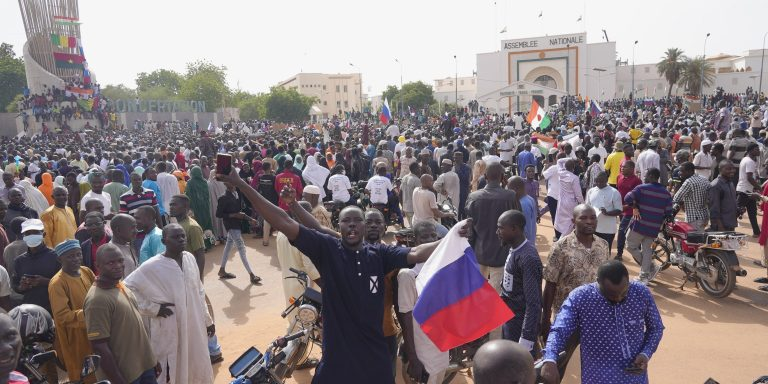Global hotspots like the Sahel have lost the attention of international media and policymakers to the ongoing conflict in Gaza.
Sahelian states’ movement away from Europe and toward Moscow has accelerated over the past year.
After being pushed out of some Malian towns and villages by Islamic State Sahel Province, Jama’at Nusrat al-Islam wal-Muslimin has set its sights on areas within coastal West Africa.
More than half of Burkina Faso’s territory is beyond the control of the government, which has concentrated on cracking down on civil society, journalists, and political opposition rather than combating jihadist groups.
International media coverage of the ongoing conflict between Hamas and Israel in Gaza has pushed even highly-scrutinized conflicts like Russia-Ukraine to the periphery, leaving other global hotspots like the Sahel with even less attention than they had before the war. The African region faces numerous challenges, from poor governance to limited resources to deal with climate change. Since 2020, Guinea, Burkina Faso, Mali, Niger, Chad, and Sudan have all experienced coups. Burkina Faso, Mali, and Niger, in particular, have banded together in an effort to legitimize their military juntas, seeking to oust Western influence while welcoming overtures from Russia. Ouagadougou, Bamako, and Niamey have joined together to form the Alliance of Sahel States. This alliance purports to be built around economic, political, and security issues. However, some see it as merely a half-hearted response to sanctions levied by the Economic Community of West African States (ECOWAS) against Niger. The junta leaders are likely to devote bandwidth to security concerns, leaving socio-economic and political grievances, especially those related to human rights abuses, unaddressed.
Sahelian states’ movement away from Europe and toward Moscow has accelerated over the past year. Niger recently announced that it would withdraw from the European Union (EU) Military Partnership Mission in Niger as well as the EU Civilian Capacity-Building Mission. Both Niger and Burkina Faso plan to withdraw from the Group of Five (G-5) Sahel alliance established by France and the EU, leaving only Chad and Mauritania in the alliance since Mali withdrew last year. A Russian delegation recently visited Niger, where Russia’s Deputy Minister of Defense, Lounous-Bek Evkourov met with Gen. Abdourahmane Tchiani, Niger’s junta leader, and Salifou Mody, Niger’s Minister of State for National Defense. Growing defense cooperation between Moscow and Niamey could see a deployment of Russian forces in the near future, as the Wagner Group undergoes a transformation following the death of its leader Yevgeny Prigozhin, who was killed when his plane crashed in August, two months to the day after he led an aborted mutiny against the Kremlin. In a hint of what could come next for the Wagner Group, Russia announced in late November the launch of its “Africa Corps” unit, which is a recruitment effort by the Russian Ministry of Defense to begin folding Wagner personnel into its command structure in order to provide continuity to ongoing operations on the continent while also preparing for an expansion. Russia’s intentions there will be magnified by the security vacuum that has followed the drawdown of U.S. and French forces from the region and the end of United Nations Multidimensional Integrated Stabilization Mission in Mali (MINUSMA).
Throughout the Sahel, jihadist groups are rapidly gaining in strength. The Islamic State Sahel Province (ISSP) has recruited scores of new fighters and is taking control of large swaths of territory throughout the region. ISSP is also shifting focus to governance in some of the areas where it retains operational control, a worrisome trend that could further entrench the group throughout the Sahel. If ISSP’s governance proves more attractive than what junta leaders in the region can offer, it will be a major challenge that is difficult to reverse. Some analysts are growing concerned that, over time and with enough resources, an Islamic State branch in sub-Saharan Africa could look to establish a mini-caliphate, drawing fighters from throughout the region and perhaps from further afield. ISSP has engaged in sporadic battles with al-Qaeda’s Sahelian branch, Jama’at Nusrat al-Islam wal-Muslimin (JNIM). After being pushed out of some towns and villages in Mali by ISSP, JNIM has begun to set its sights on taking over areas within coastal West Africa, ramping up attacks in Ivory Coast, Benin, Togo, and Ghana.
Even with additional muscle provided by the Russians, Sahelian junta leaders will need to figure out how to deal with the growing terrorism threats currently plaguing their respective countries. Burkina Faso now suffers the second most terrorism-related deaths worldwide, after Afghanistan, with few signs of this trend abating. In late November, at least 40 civilians were slaughtered by JNIM militants in Djibo, a besieged town along the Burkinabe-Malian border, according to the UN Human Rights Office. The United Nations labeled the attack a war crime, noting that the al-Qaeda-linked terrorists also set fire to three camps established for internally displaced persons. In early November, at least 70 civilians – primarily children and the elderly – were killed in Zaongo, a village located to the northeast of Burkina Faso’s capital, Ouagadougou. More than half of Burkina Faso’s territory is beyond the control of the government, which has concentrated its resources on cracking down on civil society organizations, journalists, and viable political opposition rather than on combating jihadist groups linked to al-Qaeda and the Islamic State. As Russian actors further destabilize the countries where they operate and push civilians into the arms of jihadist groups, the Sahel is poised to devolve into an ungoverned region dominated by terrorist organizations, many of which are growing their capabilities with each passing month. While they profess to be engaged in great power competition, the United States, France, and other Western countries are distracted by conflict in the Middle East and Europe, showing little hint of a coherent strategy on how to deal with the situation in the Sahel, even as Russia, China, and other near-peer competitors make inroads on the continent.

